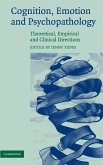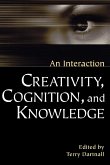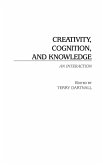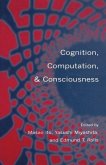Jenny Yiend (ed.)Theoretical, Empirical and Clinical Directions
Cognition, Emotion and Psychopathology
Theoretical, Empirical and Clinical Directions
Herausgeber: Yiend, Jenny
Jenny Yiend (ed.)Theoretical, Empirical and Clinical Directions
Cognition, Emotion and Psychopathology
Theoretical, Empirical and Clinical Directions
Herausgeber: Yiend, Jenny
- Broschiertes Buch
- Merkliste
- Auf die Merkliste
- Bewerten Bewerten
- Teilen
- Produkt teilen
- Produkterinnerung
- Produkterinnerung
This edited collection is a tribute to Andrew Mathews, distinguished researcher in cognition and emotion. It presents a 'state of the art' account of the cognitive--clinical literature and sets an agenda for future work. The book is structured around theoretical, empirical and clinical approaches.
Andere Kunden interessierten sich auch für
![Cognition, Emotion and Psychopathology Cognition, Emotion and Psychopathology]() Jenny Yiend (ed.)Cognition, Emotion and Psychopathology118,99 €
Jenny Yiend (ed.)Cognition, Emotion and Psychopathology118,99 €![Environment, Cognition, and Action Environment, Cognition, and Action]() Tommy Garling / Gary W. Evans (eds.)Environment, Cognition, and Action164,99 €
Tommy Garling / Gary W. Evans (eds.)Environment, Cognition, and Action164,99 €![Creativity, Cognition, and Knowledge Creativity, Cognition, and Knowledge]() Creativity, Cognition, and Knowledge45,99 €
Creativity, Cognition, and Knowledge45,99 €![Oxford Handbook of Emotion, Social Cognition, and Problem Solving in Adulthood Oxford Handbook of Emotion, Social Cognition, and Problem Solving in Adulthood]() Oxford Handbook of Emotion, Social Cognition, and Problem Solving in Adulthood176,99 €
Oxford Handbook of Emotion, Social Cognition, and Problem Solving in Adulthood176,99 €![Creativity, Cognition, and Knowledge Creativity, Cognition, and Knowledge]() Creativity, Cognition, and Knowledge88,99 €
Creativity, Cognition, and Knowledge88,99 €![Cognition, Computation & Consciousness Cognition, Computation & Consciousness]() Miyashita Rolls ItoCognition, Computation & Consciousness186,99 €
Miyashita Rolls ItoCognition, Computation & Consciousness186,99 €![Cognition, Literature, and History Cognition, Literature, and History]() Cognition, Literature, and History176,99 €
Cognition, Literature, and History176,99 €-
-
-
This edited collection is a tribute to Andrew Mathews, distinguished researcher in cognition and emotion. It presents a 'state of the art' account of the cognitive--clinical literature and sets an agenda for future work. The book is structured around theoretical, empirical and clinical approaches.
Produktdetails
- Produktdetails
- Verlag: Cambridge University Press
- Seitenzahl: 322
- Erscheinungstermin: 10. August 2011
- Englisch
- Abmessung: 229mm x 152mm x 17mm
- Gewicht: 469g
- ISBN-13: 9780521541749
- ISBN-10: 0521541743
- Artikelnr.: 20961178
- Herstellerkennzeichnung
- Libri GmbH
- Europaallee 1
- 36244 Bad Hersfeld
- gpsr@libri.de
- Verlag: Cambridge University Press
- Seitenzahl: 322
- Erscheinungstermin: 10. August 2011
- Englisch
- Abmessung: 229mm x 152mm x 17mm
- Gewicht: 469g
- ISBN-13: 9780521541749
- ISBN-10: 0521541743
- Artikelnr.: 20961178
- Herstellerkennzeichnung
- Libri GmbH
- Europaallee 1
- 36244 Bad Hersfeld
- gpsr@libri.de
Jenny Yiend is a Research Fellow at the Dept of Psychiatry, University of Oxford. She was previously a research scientist at the MRC Cognition and Brain Sciences Unit in Cambridge.
An introduction and synthesis Jenny Yiend; Andrew Mathews: a brief history
of a clinical scientist T. D. Borkovec; Part I. Theoretical Approaches: 1.
The positive and negative consequences of worry in the etiology of
generalized anxiety disorder: a learning theory perspective Susan Mineka;
2. Trait anxiety, repressors, and cognitive biases Michael W. Eysenck; 3. A
cognitive-motivational perspective on the processing of threat information
and anxiety Karin Mogg and Brendan P. Bradley; 4. Maintenance or capture of
attention in anxiety related biases? Elaine Fox; Part II. Empirical
Directions: 5. Habits of thought produce memory biases in anxiety and
depression Paula Hertel; 6. Anxiety and the resolution of ambiguity Anne
Richards; 7. Dissociative methods in the study of emotion Andrew D.
Lawrence, Fionnuala C. Murphy and Andrew J. Calder; 8. The causal status of
anxiety-linked attentional and interpretive bias Colin MacLeod, Lynlee
Campbell, Elizabeth Rutherford and Edward Wilson; 9. The experimental
modification of processing biases Jenny Yiend and Bundy Mackintosh; Part
III. Clinical Perspectives: 10. Maintenance mechanisms in social anxiety:
an integration of cognitive biases and emotional processing theory Jonathan
D. Huppert and Edna B. Foa; 11. Mental imagery and social phobia Colette R.
Hirsch and David M. Clark; 12. Experimental cognitive psychology and
clinical practice: autobiographical memory as a paradigm case J. Mark G.
Williams; 13. Mindfulness-based cognitive therapy John D. Teasdale; 14.
Clinical difficulties to revisit Gillian Butler.
of a clinical scientist T. D. Borkovec; Part I. Theoretical Approaches: 1.
The positive and negative consequences of worry in the etiology of
generalized anxiety disorder: a learning theory perspective Susan Mineka;
2. Trait anxiety, repressors, and cognitive biases Michael W. Eysenck; 3. A
cognitive-motivational perspective on the processing of threat information
and anxiety Karin Mogg and Brendan P. Bradley; 4. Maintenance or capture of
attention in anxiety related biases? Elaine Fox; Part II. Empirical
Directions: 5. Habits of thought produce memory biases in anxiety and
depression Paula Hertel; 6. Anxiety and the resolution of ambiguity Anne
Richards; 7. Dissociative methods in the study of emotion Andrew D.
Lawrence, Fionnuala C. Murphy and Andrew J. Calder; 8. The causal status of
anxiety-linked attentional and interpretive bias Colin MacLeod, Lynlee
Campbell, Elizabeth Rutherford and Edward Wilson; 9. The experimental
modification of processing biases Jenny Yiend and Bundy Mackintosh; Part
III. Clinical Perspectives: 10. Maintenance mechanisms in social anxiety:
an integration of cognitive biases and emotional processing theory Jonathan
D. Huppert and Edna B. Foa; 11. Mental imagery and social phobia Colette R.
Hirsch and David M. Clark; 12. Experimental cognitive psychology and
clinical practice: autobiographical memory as a paradigm case J. Mark G.
Williams; 13. Mindfulness-based cognitive therapy John D. Teasdale; 14.
Clinical difficulties to revisit Gillian Butler.
An introduction and synthesis Jenny Yiend; Andrew Mathews: a brief history
of a clinical scientist T. D. Borkovec; Part I. Theoretical Approaches: 1.
The positive and negative consequences of worry in the etiology of
generalized anxiety disorder: a learning theory perspective Susan Mineka;
2. Trait anxiety, repressors, and cognitive biases Michael W. Eysenck; 3. A
cognitive-motivational perspective on the processing of threat information
and anxiety Karin Mogg and Brendan P. Bradley; 4. Maintenance or capture of
attention in anxiety related biases? Elaine Fox; Part II. Empirical
Directions: 5. Habits of thought produce memory biases in anxiety and
depression Paula Hertel; 6. Anxiety and the resolution of ambiguity Anne
Richards; 7. Dissociative methods in the study of emotion Andrew D.
Lawrence, Fionnuala C. Murphy and Andrew J. Calder; 8. The causal status of
anxiety-linked attentional and interpretive bias Colin MacLeod, Lynlee
Campbell, Elizabeth Rutherford and Edward Wilson; 9. The experimental
modification of processing biases Jenny Yiend and Bundy Mackintosh; Part
III. Clinical Perspectives: 10. Maintenance mechanisms in social anxiety:
an integration of cognitive biases and emotional processing theory Jonathan
D. Huppert and Edna B. Foa; 11. Mental imagery and social phobia Colette R.
Hirsch and David M. Clark; 12. Experimental cognitive psychology and
clinical practice: autobiographical memory as a paradigm case J. Mark G.
Williams; 13. Mindfulness-based cognitive therapy John D. Teasdale; 14.
Clinical difficulties to revisit Gillian Butler.
of a clinical scientist T. D. Borkovec; Part I. Theoretical Approaches: 1.
The positive and negative consequences of worry in the etiology of
generalized anxiety disorder: a learning theory perspective Susan Mineka;
2. Trait anxiety, repressors, and cognitive biases Michael W. Eysenck; 3. A
cognitive-motivational perspective on the processing of threat information
and anxiety Karin Mogg and Brendan P. Bradley; 4. Maintenance or capture of
attention in anxiety related biases? Elaine Fox; Part II. Empirical
Directions: 5. Habits of thought produce memory biases in anxiety and
depression Paula Hertel; 6. Anxiety and the resolution of ambiguity Anne
Richards; 7. Dissociative methods in the study of emotion Andrew D.
Lawrence, Fionnuala C. Murphy and Andrew J. Calder; 8. The causal status of
anxiety-linked attentional and interpretive bias Colin MacLeod, Lynlee
Campbell, Elizabeth Rutherford and Edward Wilson; 9. The experimental
modification of processing biases Jenny Yiend and Bundy Mackintosh; Part
III. Clinical Perspectives: 10. Maintenance mechanisms in social anxiety:
an integration of cognitive biases and emotional processing theory Jonathan
D. Huppert and Edna B. Foa; 11. Mental imagery and social phobia Colette R.
Hirsch and David M. Clark; 12. Experimental cognitive psychology and
clinical practice: autobiographical memory as a paradigm case J. Mark G.
Williams; 13. Mindfulness-based cognitive therapy John D. Teasdale; 14.
Clinical difficulties to revisit Gillian Butler.









